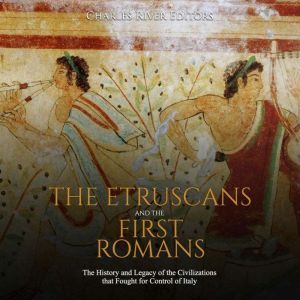

List: $6.95
| Sale: $4.87
Club: $3.47
The Etruscans and the First Romans: The History and Legacy of the Civilizations that Fought for Control of Italy
Author: Charles River Editors
Narrator: Stephen Platt
Unabridged: 2 hr 2 min
Format: Digital Audiobook Download
Publisher: Charles River Editors
Published: 03/10/2020
Categories: Nonfiction, History, Roman History, Ancient History, European History
Synopsis
“These people of Greek descent were called Etruscans, and it has been discovered that they had advanced so far in civilization, that they afterwards gave many of their customs to the city of Rome when it came to power. A confederacy known as the ‘Twelve Cities of Etruria’ became famous afterwards, though no one knows exactly which the twelve were.” – Arthur Gilman, The Story of Rome from the Earliest Times to the End of the RepublicWhen people think of ancient Italy, the Romans are usually the first and last people that come to mind, but long before Rome was built by Latin speaking people, the culture of Italy was dominated by the Etruscans. Although the Etruscans may not comprise the core of most histories of the ancient Mediterranean, they exerted a profound influence on the region from the 8th-5th centuries BCE that continued to resonate for centuries after as the Romans carried on many of their traditions. Today, much of what is known about the Etruscans comes from the ancient Roman and Greek writers who had a deep respect for them but saw them as exotic and foreign. As the famous Roman philosopher Seneca wrote about the Etruscans, “Whereas we believe lightning to be released as a result of the collision of clouds, they believe that the clouds collide so as to release lightning: for as they attribute all to deity, they are led to believe not that things have a meaning insofar as they occur, but rather that they occur because they must have a meaning.” The Etruscans referred to themselves as “Rasenna” in their own language, but the Greeks called them “Tyrrhenians” and the Romans referred to them as “Etrusci”, which is where the modern term “Etruscan” is derived (Cornell 1995, 45). As this suggests, reconstructing Etruscan history is based primarily on the Greco-Roman accounts, but other sources are utilized by modern scholars to create a more accurate picture.
